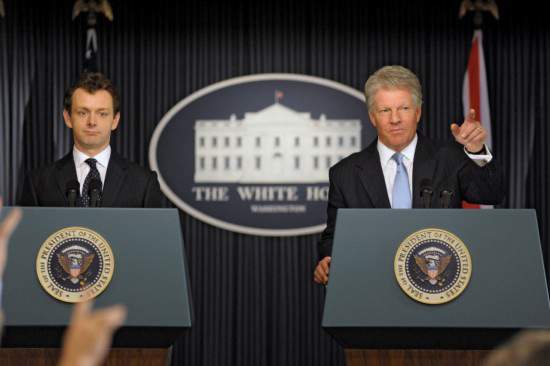The Special Relationship
Longed to see the grandeur and mythmaking of American drama combined with the British penchant to satirise? This co-production between America's HBO and Britain's BBC Films brings the two worlds together with surprising ease.
Overview
Longed to see the grandeur and mythmaking of American drama combined with the British penchant to satirise, depict government by fools, strip away the stateliness of 'great men' and film people in bathtubs? This co-production between America's HBO and Britain's BBC Films brings the two worlds together — with surprising ease.
The tone is pitch-perfect in The Special Relationship, screenwriter Peter Morgan's third film about British Prime Minister Tony Blair (after The Deal and The Queen — and he's been responsible for Frost/Nixon and The Damned United in between). It is an insightful portrait of the relationship between Blair (Michael Sheen) and US President Bill Clinton (Dennis Quaid) that casts them as men of both action and accident, driven by ideals and petty personal proclivities.
The 'special relationship' of the title refers to the close strategic ties that have bound their nations for over two centuries — although, as this film would have it, the ties between Blair and Clinton were so special that the whole George W. Bush thing is excised to a loaded epilogue. The film begins in 1992 with Blair learning to shape New Labour in the model of Clinton's New Democrats and follows the men through the Northern Ireland peace process, the Monica Lewinsky scandal and the NATO bombing of Yugoslavia. It also explores the very different dynamics of the two first couples (with Helen McCrory and Hope Davis brilliant as Cherie Blair and Hillary Clinton respectively).
You buy Sheen as Blair from the first moment; his Brit-toff everyman quality aids the transformation, as does the fact he's been Blair three times now, and when it counts, he copies Blair's cadences to the brittle letter. Beside him, it looks odd that Quaid does an impression of Clinton, with make-up as thick as his accent. It's possible that nobody naturally looks or talks like Clinton, but for the film, it means his character remains on the outer.
Unfortunately, even the closest political friendships amount to little more than a few transatlantic, late-night phone calls; as a dramatic bromance, it falls a few beers short. That makes the film's central conceit a little flimsy and the narrative episodic rather than cinematic. The flipside of this is that, once settled, it is like watching a TV series — and these days, that's a compliment. Morgan's acuity for the political, personal and hilariously trivial (Clinton is a midnight snacker who thinks Blair is "an attractive man" — who knew?) could fill several instalments yet.





